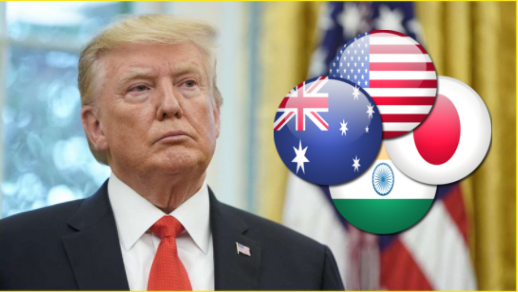The thing about a stable world order is that someone has to lead the planet. But the United States of America is done playing the universal big brother. The incumbent US President Donald Trump doesn’t believe in traditional American interventionism, which was at times warranted and at times completely unnecessary. Trump knows that more often than not; the costs of intervention far outweigh its benefits and this forms the crux of his ‘America First’ policy.
But who will fill in the leadership vacuum that is being left behind by the US? Atlantic is no longer a strategic hotspot and therefore Europe gets ruled out, Russia is no longer a big enough giant to play world leader and China can only bully, not lead. Therefore, the world has to find a new leader in QUAD- an informal strategic coalition comprising India, the US, Japan and Australia.
As for the US, it is not as if Trump watched over the receding American influence or intervention across the world. It wasn’t something that the US President overlooked, rather it was a conscious decision given how American intervention in countries like Syria, Libya, Egypt or Afghanistan did not meet desired objectives.
Therefore, ‘America First’ or pulling out from certain conflict zones was more of a conscious and well thought out move on the Trump administration’s part. Trump no longer feels the need of diverting White House’s energies towards distant regions like the Middle East, the African Continent or Central Asia.
In fact, the US hasn’t got itself involved in the Nagorno-Karabakh conflict that has broken out between Armenia and Azerbaijan. Moreover, Washington has already pulled itself out of Syria and is preparing to bring back its troops from Afghanistan also. Even in Eastern Mediterranean where Turkey is trying to bully Cyprus and Greece, Trump administration hasn’t gone beyond issuing statements even though NATO allies are involved.
Yet, the US has maintained some influence by brokering the Abraham Accord between Israel and the UAE, and bringing the Gulf closer to Washington’s closest Middle East ally- Israel.
On the other hand, QUAD is itself located in the current strategic hotspot of the world, the Indo-Pacific. All four members of this unique organisation are the biggest beacons of democracy in the region. Therefore, all these four countries enjoy unmatched ideological and geo-strategic influence in the present world order.
Every single QUAD member has a bigger role to play in the changing world. Japan and India, for example, bring with them the ability to beat back a common enemy in China, which is presently the biggest security threat to the Indo-Pacific and even the world at large. Japan and India are exercising all their influence in the Indian Ocean Region (IOR) as well as the Western Pacific in order to avoid small island/archipelago nations from falling into the paper dragon’s lap.
Therefore, New Delhi and Tokyo have been reaching out to countries like Vietnam, the Philippines, Indonesia, the Maldives, Bangladesh, Myanmar and Sri Lanka in South and Southeast Asia. The most apparent agenda in the Indo-Japanese relationship is to ensure that Chinese ambitions to dominate the key regions remain unfulfilled. Similarly, in the African Continent, India and Japan are amongst the ones ensuring that Beijing doesn’t get to fulfil all the vacuum that Washington is leaving behind.
It is the geographical expanse of QUAD which helps it in leading some of the most critical parts of the world. Take for example, Central Asia in which the US is not evincing much interest and where Russia is no longer the only superpower wielding influence. The Middle Kingdom has been trying to gobble up resource-rich region, but again India is balancing out power equations.
Similarly, in the South Pacific, the biggest Oceania power- Australia, is showing intent to keep China at bay. Under Prime Minister Scott Morrison’s leadership, Australia has not shied away from criticising Beijing’s hawkishness and attempted unilateralism. Canberra has taken the initiative time and again on issues like Chinese interference in Hong Kong and Taiwan’s legitimate ambitions of finding greater global recognition.
Even apart from Canberra’s bold stance of standing up for democratic values, Australia has a key role to play in South Pacific. Take for example, the strategically located Papua New Guinea– an island country just to the North of Australia that serves as an outpost against China in the Western Pacific. The island country was falling into the Chinese debt trap not very long ago, but it has now been rescued by Canberra from the paper Dragon’s tentacles.
The QUAD is therefore ready and willing to lead the world against all security threats and destabilising factors. Today, any country that wants to play a meaningful role in active geopolitics has to align itself with the QUAD.
France, for example, has sought a closer relationship with countries like India and Australia while trying to maintain its influence in the Pacific. Going ahead, Paris is looking to play a bigger role in the Pacific, Eastern Mediterranean, Gulf and South Caucasus, but eventually it would form a deep understanding with the QUAD and achieve common objectives vigorously.
The days of a US-led world are over, and now the era of a QUAD-led world order is bound to set in.
